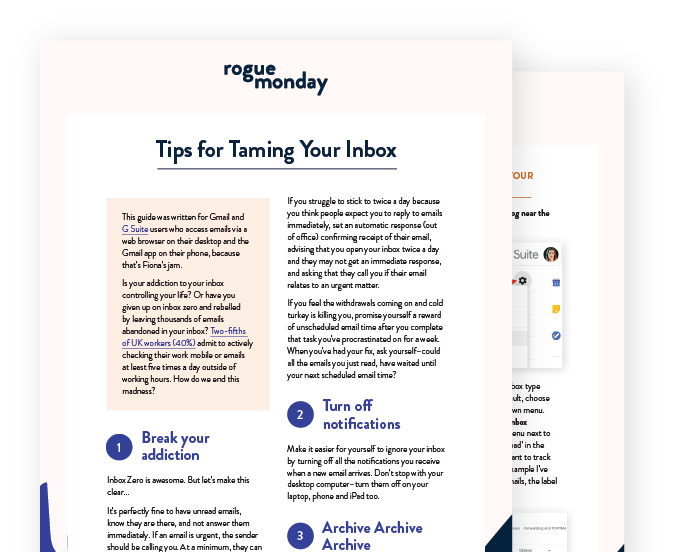Sleeping when you want… working when it suits you… sipping lattes in trendy cafes while you check emails… having no limitations on your earning potential…
You’ve got a long list of all the pros… but are you ready for what working remotely is really like?
A 2017 study with 500 employees found that working from home definitely increases productivity for many people, and anyone can find a way for it to work.
Elisha and I have been working from home for years now and I want to share just some of the misconceptions we’ve both realised people have about leaving office jobs behind.
#1 All the distractions disappear
If you’ve ever gotten into the office a couple of hours before your colleagues or stayed back well after everyone has gone home, you may associate the amazing productivity you found with not having anyone in the office with you.
You may also assume you’ll become that efficient machine at home for the entire day, instead of just.
It’s not that simple.
When you’re at home with the whole day to yourself, you may be more productive for lack of interruptions, but you will probably find it harder to just start working, let alone ignore that pile of unopened mail.
You’ll need to come up with new ways to give yourself deadlines and motivation while you’re at home. I like using Toggl as I work in the background, this helps keep the time pressure on.
You may also find that you need to train some family and friends who have their own misconceptions about what you working from home means. You’ll probably need to get better at saying “no” and reminding them that you are, in fact, working until they start treating you like you have a ‘real’ job again.
You’ll probably need to get better at saying “no” and reminding them that you are, in fact, working until they start treating you like you have a ‘real’ job again.
#2 Flexibility is off the charts
If you’re working for yourself you’ll have more flexibility to work around your non-work commitments… Though you still need to take yourself seriously before others will.
Chances are, your clients or remote employer will still expect you to be available during normal business hours and many will try pushing the boundaries of what business hours are because they never see you leave the office.
Exceptional communication and management of expectations is important whether you’re working virtually for yourself, or someone else.
I can’t stress enough the importance of being very responsive to your colleagues, let alone your clients.

I’m very lucky to be able to drop off my kids and pick them up from school regularly. I also have weekly tasks I allocate to the time I’m “watching” my daughter play tennis. I can only do this because I manage client expectations and work the hours required to get work done. Sometimes I miss sitting on the couch with my husband after the kids are in bed to make up for lost time and to get a job out the door.
In the past, it’s also meant that there were clients I needed to turn down because I couldn’t meet their availability needs. I’ve started managing a team of VAs to meet this demand, though you need to understand if flexibility is a need or a want and whether you can afford to turn clients away in pursuit of that flexibility.
Rogue Monday can afford to do this because our relationship with flexibility works both ways.
We have clients who are in completely different time zones and others who are engaging us to assist them with their side gig after their own day job. We can be there for our children if needed during the day, knowing we have income-generating meetings scheduled for after our children are in bed.
Was this the flexibility you had in mind?
Working remotely doesn’t give you magical flexibility powers allowing you to be efficient whenever you want. You still need to understand your personal peak energy times, learn to eat that frog and allocate time for your most analytical tasks if you want to own your day.
#3 It’s an introvert’s dream and extrovert’s nightmare
Being an introvert or extrovert won’t lead to your success or failure in a remote role if you don’t understand how to manage your individual needs.
While it’s easier for introverts to find comfort in the isolation found in most remote roles, extroverts can take comfort knowing there are virtual opportunities with a focus on constant communication with your colleagues and regular clients where meaningful relationships are formed.
If you can’t find your ideal extrovert-friendly role in an office, and your circumstances are forcing you into remote work, consider the following:
- Rent a coworking space a day or more a week to suit your budget, then weigh up the benefit against the cost
- Leave the house for lunch – you don’t have to spend money at a cafe to eat where other people are – pack a lunchbox!
- Suggest your virtual team connect via a messaging platform like Slack (include a watercooler channel for non-work related chats) and connect for meetings via video (instead of phone) calls via something like Zoom
- Attend regular social events outside work time, such as networking or a group sport
- Join a mastermind group with others in your industry
- Hire a VA through Rogue Monday – accountability calls are your secret weapon!
#4 You can work from anywhere
If you were thinking of working as you travel, you need to dedicate (unpaid!) time to planning ahead to ensure you’ll have internet reception when you need to.
Working from cafes may sound ideal, though you need to consider the realities of doing this:
- The coffee and parking is cheaper at home
- Will the internet speed be sufficient?
- Will the conversations of strangers at other tables distract you?
- Do you find it difficult to tell people you’re busy and stop friendly cafe goers or staff chatting to you?
- How long does your laptop battery last, or does the cafe let you plugin?
- How much time are you losing in travel and finding a park
#5 You can wear what you want
You may have visions of throwing on a jacket and angling your camera to hide your yoga pants for your video meeting… though take a moment to consider your personality type.
Some people can rock their dressing gown all day and be efficient machines via laptop without leaving their bed, whilst others swear by changing their clothes to switch on their professional brain.
Like all aspects of working from home, you need to start by getting to know yourself better.
We personally love working from home, there are some wonderful advantages. So if it suits you, and you take the time to realistically consider your working style and needs, (and don’t think it will be all lattes and working on the beach) you might find it works for you.
If you’re already working from home, we’d love to hear what realities you’ve learnt about your change in scenery in the comments below.


Leave a Reply